Is it Possible to Become a Racer? These First Generation Racers Share Their Experiences
Published by Crate Insider on 11th Jun 2014
Sometimes inspiration occurs in the strangest ways. I was talking with someone in the racing industry about Crate Insider. I told them that I really wanted the site to be a resource for both seasoned racers and guys just starting out. I’d like to encourage those passionate fans who have a dream of racing to make the move from a seat in the stands to being behind the wheel even if they don’t have a family legacy of racing. And that’s when the argument started……
I was told that it just doesn’t happen. Every racer has a father, an uncle, or a cousin who raced before. I couldn’t think of any racer I knew that didn’t fit the statement, so I had to concede. However, it didn’t change my opinion about wanting to encourage people who want to race. And, I wanted to find out if first generation racers existed or if they were the myth I was told they were.
The very next day, I published an announcement on Facebook asking first generation racers to contact us. And they did. Of course, I like to be right, but even more importantly, I have to say that it was an incredible experience to hear their stories. We asked them what inspired them, how they got started, what they found to be the most challenging, advice they would give to someone trying to get started and whether they thought there was any advantage to being a first generation racer.
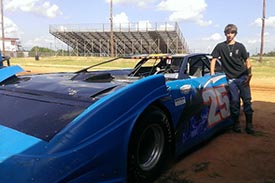 Elijah Gonzales, 604 Late Model, Bartow, GAElijah’s inspiration happened at a very early age. “When I was a little boy, I remember sitting in my grandfather's lap watching NASCAR on TV. Ever since then, I've always dreamed about racing, so I told him I wanted to be a racecar driver one day. He and my family did everything they could to help fulfill my dreams and here I am.” His advice to someone getting started is, “Get involved in helping people and watching what they do and learn from it, take in the advice people give you and you pick which one you feel is right. Learn by watching and listening.” When asked about his biggest challenge, he stated, “I would have to say adjusting to the attitudes of racers and how they race in this division.” And when asked if he thought there was any advantage to being a first generation racer he told us, “Yes. Being a first generation racer I have younger brothers and other family members and friends that look up to me and it brings family closer together and I get so much support from everyone.”
Elijah Gonzales, 604 Late Model, Bartow, GAElijah’s inspiration happened at a very early age. “When I was a little boy, I remember sitting in my grandfather's lap watching NASCAR on TV. Ever since then, I've always dreamed about racing, so I told him I wanted to be a racecar driver one day. He and my family did everything they could to help fulfill my dreams and here I am.” His advice to someone getting started is, “Get involved in helping people and watching what they do and learn from it, take in the advice people give you and you pick which one you feel is right. Learn by watching and listening.” When asked about his biggest challenge, he stated, “I would have to say adjusting to the attitudes of racers and how they race in this division.” And when asked if he thought there was any advantage to being a first generation racer he told us, “Yes. Being a first generation racer I have younger brothers and other family members and friends that look up to me and it brings family closer together and I get so much support from everyone.”
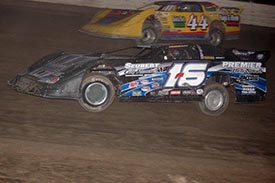 Scott Anderson CT525 Sprint Car, Spearfish, SD
Scott Anderson CT525 Sprint Car, Spearfish, SD
Scott got started because, “My grandparents took me to the races to watch. Then, my uncle pitted for John Bey, a local late model guy. I just really looked up to my uncle, and John too. I started hanging out in the pits as soon as I was old enough, and that lasted until after I graduated from college. At that point, I decided that racing, or for the ability to someday drive a car, was the reason I went to college in the first place, so I might as well just do it. So in late 2004, I put together my first dirt late model, and raced it.” Scott advises new racers to “go to a setup school. Every winter, Mark Bush's "Race-Wise" classes have helped me in more ways than I can count. I value his advice and information as some of my best tools when it comes to making a car handle well.” For his biggest challenge, “Lately, it has been challenging to find balance. What I mean is that in the beginning, it was ALL about racing. Now, there is ever increasing responsibility at work, locations for work that are further from home, wife, a 17 month old girl named Lainey, and a little boy that's coming in March.” When asked about advantages, he tells us that “I would say so. There are no expectations placed on you, and that seems to help keep the focus on important leading indicators to success like just taking each race a day at a time, rather than trying to fill a father's shoes or live up to an expectation of a family name.”
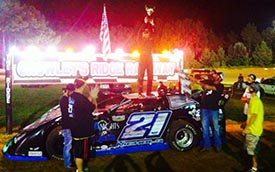 Mark Nichols, 604 Late Model, Bono, AR
Mark Nichols, 604 Late Model, Bono, AR
Mark was inspired to start racing when “My girlfriend asked me to go to the races with her to watch her dad. I reluctantly went and after he ran his heat, he asked me if I wanted to drive his car (a 4 cyl) in the feature and I said "Hell Yeah!" My girlfriend freaked out because I'd never been in a race car before. So I ran the feature and finished 5th which was better than he had finished all year. After that, he didn't get his car back for the rest of the season. I bought one that winter and have been racing full time since.” For advice, Mark tells us, “Be prepared to be hooked! It's the most addictive thing I've ever been a part of and I'm consumed by it now. I have met so many great people and made a lot of friends because of racing.” His biggest challenge has been “Moving from 4 cylinder to a 4 bar late model. All the adjustments that can and need to be made were overwhelming at first.” And regarding advantages, he tells us, “It's brought me and my nephew Michael, who works on the farm for me, closer. He's my crew chief and we've already made a lifetime worth of memories. But we're just getting started!”
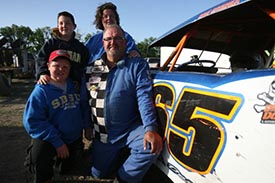 Dave Brooker, 602 Street Stock, Tulare, SD
Dave Brooker, 602 Street Stock, Tulare, SD
Dave got started because “It was just something that I had always wanted to do, and a deal came up that was too tempting to pass on.” He advises that “A new racer can gain experience by helping an established racer at the shop and at the track. Building relationships and gaining the respect of others will help you a lot. Don't start up front for a while. The other racers will be more willing to help you if you are not being a hazard on the track.” For challenges, Dave tells us: “When we started it was my father and I. We were both pure rookies. We knew absolutely nothing concerning chassis set up. Luckily, several veteran racers took us under their wings and gave us a lot of help. One guy in particular was very helpful. I still seek his advice to this day. My father has since passed on...Now it's me, my wife and our 2 sons.” He sees “The biggest advantage that I can think of is that I have no one else's shoes to fill. I'm not racing in anyone's shadow.”
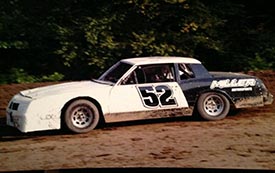 Jordan Kaspar, 602 Street Stock, Malta, NY
Jordan Kaspar, 602 Street Stock, Malta, NY
Jordan decided to race because, “Just watching my buddy and his family race, I thought that doesn't look too hard and started building a street stock. When I was building my car, I was offered to drive a 4 cylinder car if I could fix it after a collision with the wall. So, I changed the head and a new gasket and she was ready to go. I drove that 5 times and the first two times I drove it the shift linkage bushing broke and I finished in the back. So after the second time, I just welded it so it never come off. After that, I started to learn to drive and managed a 3rd, then a 2nd, and a win. That was one of the best feelings I have ever had and made me push to get my street stock done. Once I got in that, it was a rough transition from a front wheel drive to a rear wheel drive car. The first 3 weeks ended the same....spinning out leaving turn 2 and getting drilled in the left front fender. After that, I realized that I needed to learn how to drive again.” For advice, Jordan states, “I would say to learn about the class you want to race in first. Don't just try and dive in because that’s just going to cost a lot of money and time and disappointment. I spent over a year working on a crew and in a shop just to understand the basics of how to make a car go. And I would start in a class like a street stock/hobby stock especially that allows a crate engine. They take one major factor out of the equation and limit what you can do to the car so the field is limited to how you drive and not just what you drive. So, I would saw to anyone that’s looking to start racing is: Do your homework and learn about the class. Think about simplicity. And always safety first. Spend the extra money on the d.o.m. tubing or multi-layer firesuit, not the light weight gears or light weight wheels.” His biggest challenge has been, “balancing time between work and family and keeping the car properly maintained and race ready for the next week. Also, getting sponsorship for a driver/racer that has never been on the track before is also a big thing too.” He also tells us that “I think there is one main advantage to being a first generation racer. I had no bias from going out and seeing how different teams did things from building the car to what oil they use. From what I see, when you are in a racing family, it becomes almost tradition to do this this way and to do that that way. It seems some people get closed-minded on their ways and won't change them.”
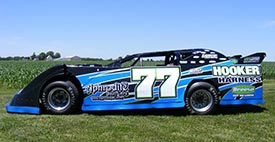 Neal McPhillips, 604 Late Model, St. Louis, MO
Neal McPhillips, 604 Late Model, St. Louis, MO
Neal got his start by “Starting to help a super late model team. At the same time we started selling racing harnesses. I sold a set of harnesses to a local team and have not looked back since.” His advice to someone getting started is, “A good crate motor is a great way to help keep your hands around the financial side of racing. Also, have to stay on top of technology as much as possible. Start out helping/working for a good team to learn the ropes.” He also points out a unique advantage to being a first generation racer: “People don't know me if I embarrass myself.”
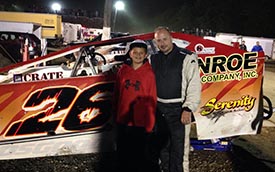 Scott Flanders, 602 Sportsman, Colonie, NY
Scott Flanders, 602 Sportsman, Colonie, NY
Scott has an interesting story about how he got started: “I used to own an RC car track and I had mentioned to one if my race announcers who was a crew chief for someone that I would love to get in a car and he said he would help, so I talked to some guys who race and went through the pits and asked questions and found a car and off I went.” His advice is to, “Watch the races closely then go into the pits, walk around ALOT and watch everything, take pics and don't be afraid to go up to the veterans and ask them questions. Introduce yourself and ask your question when you can see they are not busy. Don't hold back any questions, it's the only way to learn.” When asked about his greatest challenge, Scott told us, “For me personally, over thinking. I do much better when I just drive the car and don't fixate on what I need to do next, but just let it happen naturally.” And, on the question of whether there were any advantages, he told us, “Absolutely. There are many guys willing to help at the track that will share their years of experience to make things easier. I have been very fortunate to have help from Kyle Corbett my crew chief, Rocky Warner and Jon Miller as well has Brett Hearn.”
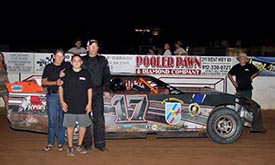 Ronnie Perryman, 602 Street Stock, Rincon, GA
Ronnie Perryman, 602 Street Stock, Rincon, GA
Ronnie was inspired at a young age. “My dad took me to my first dirt race when I was 14 and I’ve been hooked ever since. But, I am in the military and have moved around a lot in my 26 years in the service. I got started late in life in 2012 when I got my first car.” For advice, Ronnie states, “I started out by going to the track with another driver and learning the ropes and learning car setup info and techniques and gained as much knowledge as possible. When you get your first car, get a used but well-built car and take someone with you that knows cars so you don't buy a junked car that's bent. When you start you won't really know if you like it, so going all crazy and spending wads of money is senselessso go cheap and learn the ropes and then if you like it you can upgrade That's exactly how I did it and I feel I am getting better every time I go out. I run a 602 crate because they are very inexpensive motors and very reliable and although they are down on power in some classes they are really competitive in others and the reliability is why I run them. It doesn't pay to blow motors up. Once you learn the ropes and know you want to keep doing it then you will have the knowledge to shop for what you really want. You won't really know if you are a real racer until you run a full year at a track for points because you will find out real quick that it's a lot of work and if you’re not putting in the work, you will be running in the back for sure. After my first year, I couldn't wait for the next and I still look forward to every race!!” His biggest challenge has been “Sponsorship. A little help is always good to have unless you're rich. Starting out racing can be expensive if you start from scratch!”
